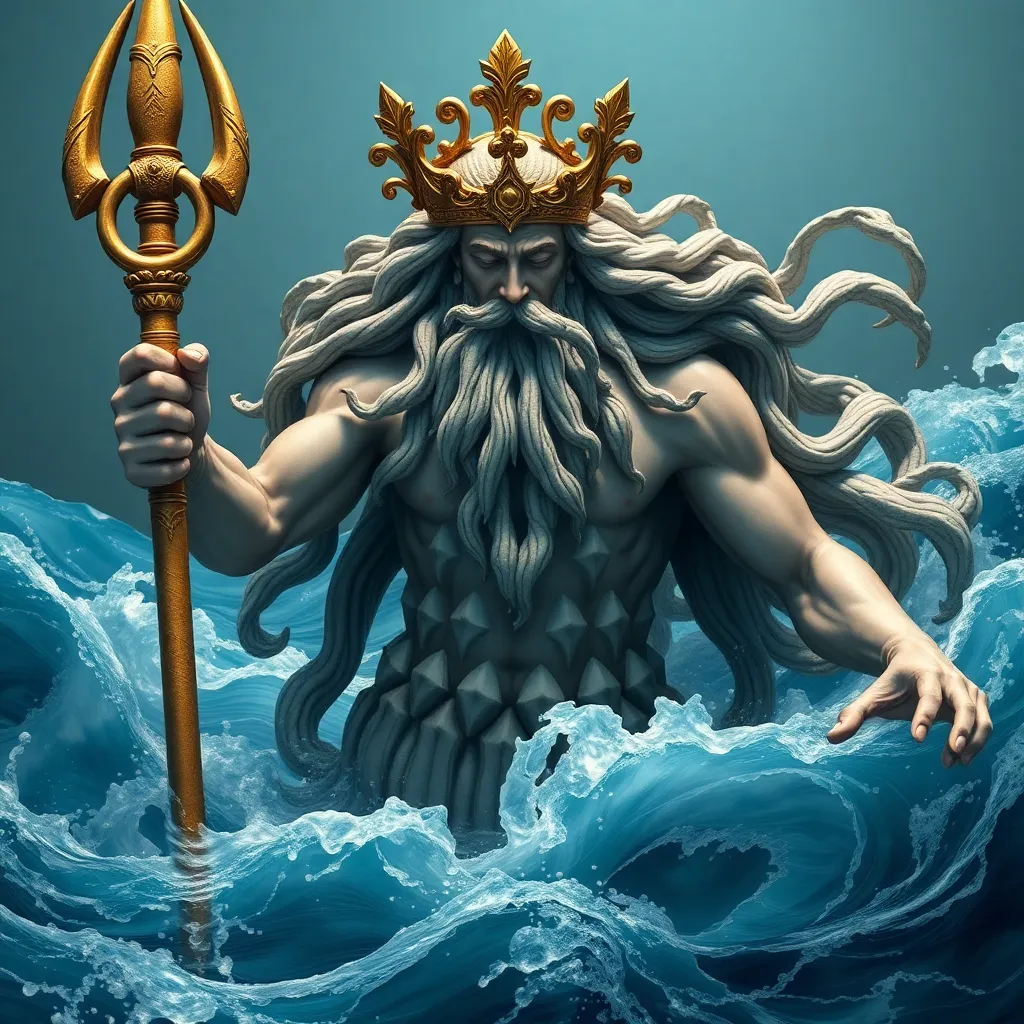Poseidon’s Influence on Mediterranean Cultures Beyond Greece
I. Introduction
Poseidon, one of the twelve Olympian deities in ancient Greek mythology, is best known as the god of the sea, earthquakes, and horses. His significance extends beyond the confines of Greece, impacting various Mediterranean cultures throughout history. Poseidon’s dominion over the ocean made him a crucial figure for societies that relied on maritime resources, navigation, and trade.
This article aims to explore Poseidon’s influence on Mediterranean cultures beyond Greece, examining how his attributes and myths permeated through different civilizations, shaping their maritime practices, beliefs, and artistic expressions.
II. Historical Context of Poseidon
Poseidon’s origins can be traced back to the early Greek pantheon, where he was revered as a powerful deity, often depicted with a trident and associated with horses and aquatic creatures. The importance of the sea in ancient Mediterranean civilizations cannot be overstated; it served as a vital route for trade, communication, and cultural exchange.
Poseidon’s attributes include:
- God of the sea and waters
- Bringer of earthquakes
- Patron of horses and horse racing
His symbolism as a god of both creation and destruction reflects the dual nature of the sea itself—capable of nurturing life while also being a source of peril.
III. Poseidon in Roman Culture
In Roman mythology, Poseidon was known as Neptune. While both deities shared similar domains, their characteristics and cultural significance evolved differently within their respective societies.
Key comparisons include:
- Neptune was often depicted in a more serene manner, reflecting the Roman ideals of order and control.
- Poseidon’s tempestuous nature was more pronounced in Greek mythology, emphasizing the unpredictable aspects of the sea.
The influence of Neptune on Roman maritime practices is evident through various rituals and festivals dedicated to him, including the Neptunalia, a celebration of the waters and their bounty. Roman art and literature frequently depicted Neptune as a majestic figure, contributing to the cultural narrative surrounding the sea. His images adorn mosaics, sculptures, and poetic works, reinforcing the importance of maritime power in Roman society.
IV. Phoenician Maritime Practices
The Phoenicians, renowned for their seafaring skills, had a profound relationship with the sea, which was central to their economy and culture. Poseidon’s influence can be observed in their deities and legends, as they often mirrored his attributes.
Significant points include:
- The Phoenician god Baal was associated with storms and the sea, sharing similarities with Poseidon.
- Trade routes established by the Phoenicians were inspired by the myths surrounding Poseidon, emphasizing the importance of navigation.
- Legends of sea monsters and maritime adventures often drew upon the imagery of Poseidon’s wrath and protection.
These connections highlight how Poseidon’s mythos contributed to the maritime identity of the Phoenician civilization.
V. Poseidon in North African Cultures
In North Africa, particularly among Berber and Carthaginian societies, Poseidon’s influence can be traced through adaptations of his mythos into local beliefs and practices.
Key adaptations include:
- Incorporation of Poseidon-like figures in local myths, often associated with fertility and the sea.
- Carthaginian deities such as Tanit, who held similar attributes related to water and fertility.
- Worship practices along the coastline, reflecting reverence for the sea and its resources.
The legacy of Poseidon is evident in the way these cultures revered the sea, blending Greek mythology with their traditional beliefs.
VI. Etruscan Interpretations of Poseidon
The Etruscans, who inhabited central Italy before the rise of Rome, also absorbed elements of Greek mythology, including the veneration of Poseidon. Their interpretations often reflected a unique blend of Etruscan and Greek beliefs.
Aspects of Etruscan mythology related to Poseidon include:
- Adoption of Poseidon’s attributes in their own deities, such as the god of the sea.
- Artistic representations in Etruscan tombs, showcasing tridents and marine motifs.
- Religious practices that involved offerings to sea deities, emphasizing the importance of the ocean.
The blending of Etruscan and Greek beliefs illustrates the fluidity of mythological narratives across cultures.
VII. Influence on Later Mediterranean Cultures
Poseidon’s legacy did not wane with the fall of the ancient civilizations; rather, it experienced a revival during the Renaissance, where artists and writers drew inspiration from classical mythology.
Notable influences include:
- Works of art depicting Poseidon and Neptune, reflecting the ideals of beauty, power, and nature.
- The establishment of maritime laws that echoed Poseidon’s authority over the seas.
- Modern cultural references, such as films and literature, that continue to portray Poseidon as a symbol of the ocean’s might.
This enduring influence underscores Poseidon’s significance as a cultural icon throughout history.
VIII. Conclusion
In summary, Poseidon’s influence transcended the boundaries of Greek mythology, permeating various Mediterranean cultures and civilizations. His attributes and stories shaped maritime practices, inspired artistic expressions, and fostered reverence for the sea.
The enduring legacy of Poseidon serves as a testament to the interconnectedness of Mediterranean civilizations through mythology, reflecting shared values and beliefs that have shaped the cultural landscape of the region.
As we explore these ancient narratives, we gain insight into the complexities of human relationships with the sea and the divine, highlighting the timeless relevance of Poseidon in our understanding of history and culture.




